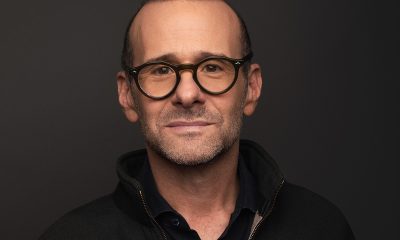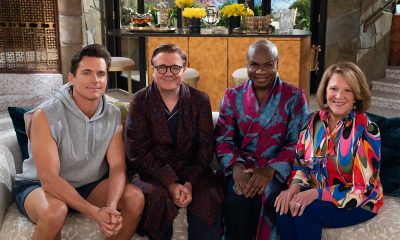Television
‘Modern Family’ creator returns to form with hilarious ‘Reboot’
Show about a show ditches tired mockumentary format
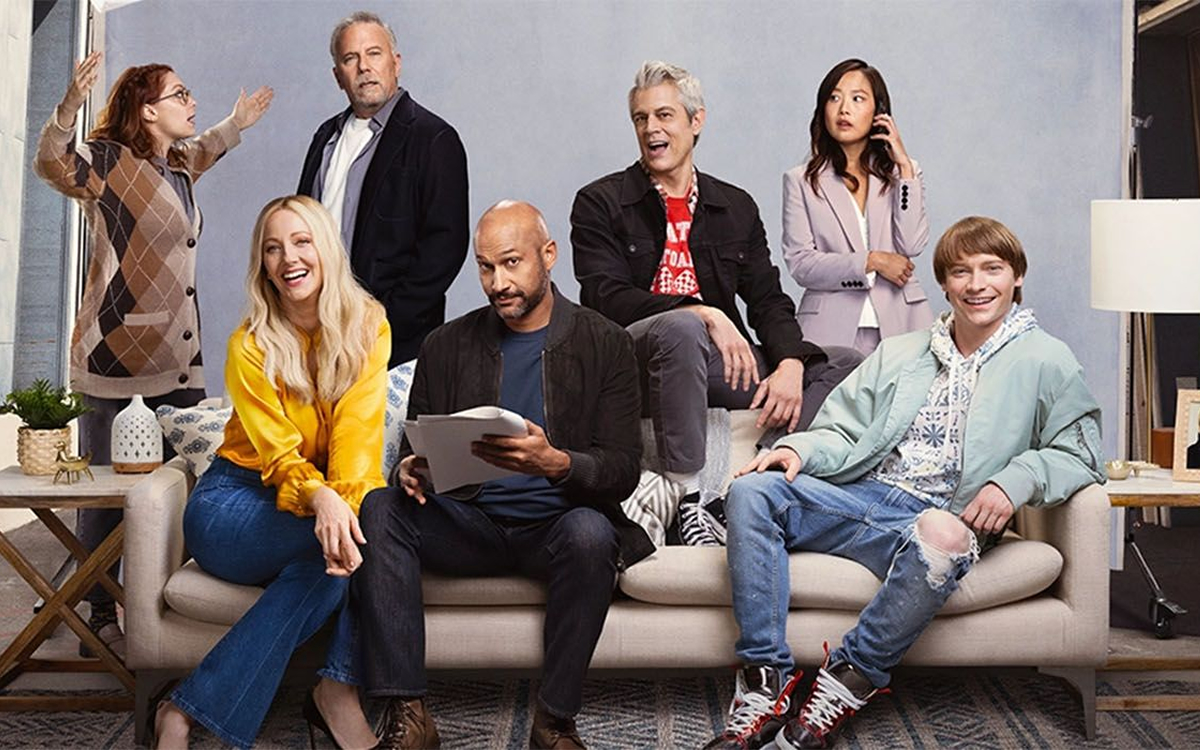
TV veteran Steven Levitan already had a lot of success as a writer, showrunner, and producer before the premiere of “Modern Family” – a series he co-created with Christopher Lloyd – in 2009. That show turned out to be a cultural phenomenon, helping to redefine and normalize the representation of LGBTQ relationships on TV by including a gay couple within its ensemble of central characters while also becoming a long-running fan-favorite, winning scores of awards (including nine primetime Emmys) and being nominated for scores more before airing its final season in 2020. Even with a resume that includes shows like “Wings,” “Frasier,” “The Larry Sanders Show,” and “Just Shoot Me,” that’s got to be considered a career-topping triumph.
Now, Levitan is back with a new show, “Reboot,” which premiered on Hulu Sept. 20, and from its very first pre-credit sequence it signals a welcome return to the same rapid-fire comedic style that kept “Modern Family” on everybody’s weekly watchlist for 11 years – still inclusive, with prominent queer characters and storylines, but thankfully without the mockumentary format.
“Reboot” is a good-naturedly irreverent send-up of the Hollywood entertainment machine featuring “Crazy Ex-Girlfriend” star Rachel Bloom as Hannah, a TV writer who gets greenlighted on her pitch for a revival of “Step Right Up,” a beloved sitcom from the early 2000s. She manages to convince the original cast to reprise their roles as the show’s “wacky family” – despite their complicated offscreen history – by promising to adapt the show for a contemporary audience, eliminating the corny, outdated humor and shifting toward a more sophisticated, realistic tone. At the first table read, however, Hannah’s plan for a reimagined series is met with a significant obstacle – the unexpected presence of the original sitcom’s creator, Gordon Gelman (Paul Reiser), who has wielded his industry clout to insert himself into the mix as a showrunner and ensure that “woke” ideas about comedy don’t get in the way of the laughs.
Obviously, this scenario provides a ripe field for jokes about the cultural conflicts that have become a fact of life in 2022 – mostly around the differing attitudes between older and younger generations, always a sure-fire bet for relatable comedy. The “OK Boomer” sparring at its core is common fodder these days, but Levitan and his creative team know comedy well enough to make it feel fresh – and their secret is to make sure that the characters are always the main attraction.
In this case, they’ve given us plenty of them to choose from. Besides Hannah and Gordon, whose rivalry for the reins quickly becomes just one of many thorns in their relationship dynamic, we also get the leading players of “Step Right Up”: Reed Sterling (Keegan-Michael Key), a Yale-trained thespian who ditched the show’s first run to pursue a movie career that never materialized; Bree Marie Johnson (Judy Greer), a once-popular star who left showbiz for a now-failed marriage to an obscure Scandinavian Duke; Clay Barber (Johnny Knoxville), a “bad boy” stand-up comic known less for his talent than for being a train wreck; and Zack Jackson (Calum Worthy), a former child star who seems to have reached his mid-20s without actually growing up. Rounding out the main ensemble is Krista Marie Yu as Elaine, a young production exec transplanted from the tech industry whose fish-out-of-water incongruity provides a necessary outsider perspective amid the show-biz histrionics that surround her.
There’s a host of supporting characters, too – a roomful of writers, for instance, hilariously bridging the generation gap with their common love of comedy even as they clash over cultural values. Drawn in broad strokes, all of them could easily be dismissed as generic tropes, stock figures updated to fit the latest cultural zeitgeist; that they come off as fully realized human beings instead of lazy stereotypes is a testament to Levitan and the real-life writers’ room responsible for bringing them to life.
It’s also a testament to the actors who play them. Key and Greer have the biggest challenge, in many ways; their characters, cut from the same egocentric cloth as so many other parodies of vain and pretentious Hollywood stars and clearly designed to be adorably insufferable, come off in early episodes as simply insufferable. As the season progresses, fortunately, their skill as performers permits them (and their characters) to rise above the flaws and foibles and win us over. The ever-reliable Knoxville does what he does best – sending up his own wild-man persona – and occasionally reminds us that he’s not a bad actor, when he gets the chance; Worthy, an ex-Disney-kid also spoofing his own real-life image, likewise injects surprising doses of winning humanity as the show goes on.
As for Bloom, essentially the main character though surrounded by an ensemble of zanies, she holds her own with all the juggernaut talent she used to make “Crazy Ex-Girlfriend” a wildly popular cult hit; required to be a grounding force while dealing with her own whirlwind of personal and professional dysfunction, she succeeds more than well enough to anchor the show. Finally, Reiser brings his status as a venerable sitcom legend to give his old-school character an appropriate presence, while making him much more layered and likable than the Archie Bunker-ish throwback we expect him to be.
With such a solid cast doing the heavy lifting onscreen, “Reboot” is able to cast its satirical net wide enough to poke fun at our rapidly changing culture without losing the important human connection that keeps its never-ending bombardment of one-liners – something for which Levitan’s previous shows have been widely known and admired – from feeling hollow. That doesn’t mean the comedy ever lulls; on the contrary, even the show’s most tender and meaningful moments – which often take us by pleasant surprise – are punctuated by zingers. And while the series leans hard into the kind of uncomplicated vibe that usually marks popular mainstream sitcoms, it also lets itself play at more complex levels, getting a lot of comedic mileage out of the inescapable “meta” quality of being a show about a show – for example, the fictional series, like the real one, is produced by Hulu, just one such cheeky touch among many that make it feel more subversive and iconoclastic than perhaps it really is.
What might work even more to the benefit of “Reboot” than the considerable lineup of talent it boasts both on and behind the screen is its format – and we’re not just talking about its choice to eschew the mockumentary thing, a masterfully innovative tactic that has now become tired from overuse, even on Emmy-favored “Abbot Elementary.” In the new era of streaming content, the 23-episode season feels like an increasingly outmoded way of doing things; with only eight episodes to undertake, there’s far less chance of stretching the material (and our patience for it) thin, or of running out of ideas and undermining the show’s integrity with sub-par writing just to pad things out.
Unsaddled from that burden, “Reboot” manages to be laugh-out-loud funny throughout each episode of its first season. That alone is enough for us to look forward to season two.
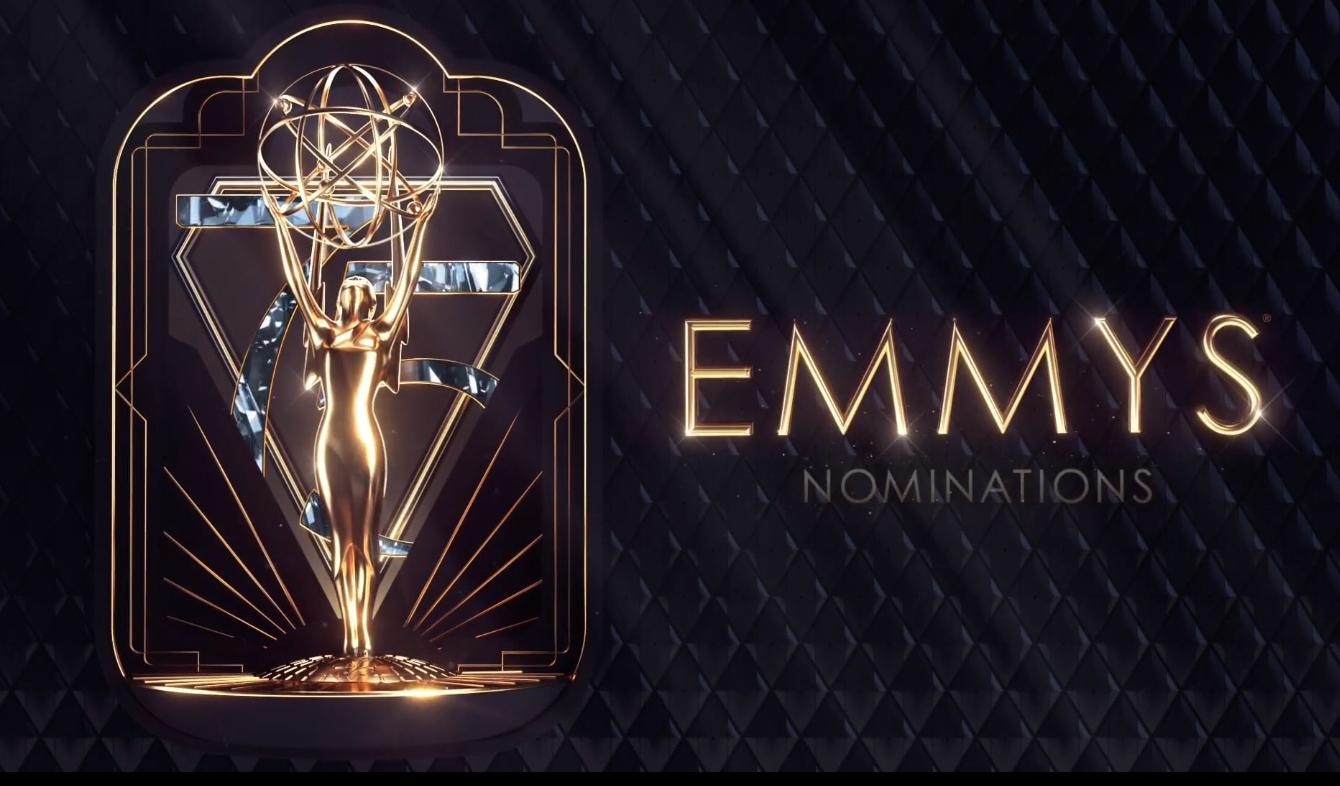
The Television Academy has honored dozens of queer creators and queer-themed TV shows in the nominations for the 76th annual Emmy Awards, announced Tuesday in a broadcast hosted by actors Tony Hale and Sheryl Lee Ralph.

Sheryl Lee Ralph and Tony Hale, along with Academy Chair Cris Abrego, announced the nominees for the 76th Emmy Awards on July 17, 2024. (Photo courtesy of Emmys.com)
The winners will be announced at the Primetime Emmy Awards on Sept. 15.
Queer-themed shows like Netflix’s “Ripley” and “Baby Reindeer” and FX’s “Feud: Capote vs. the Swans” scored nominations across 13, 12, and 10 categories respectively.
“Ripley,” based on Patricia Highsmith’s novel “The Talented Mr. Ripley” about a queer con man, scored a nomination for outstanding limited or anthology series, as well as acting nominations for gay actor Andrew Scott in the title role and Dakota Fanning for supporting actress. It also received nominations for writing, directing, cinematography, special visual effects, sound editing and mixing, picture editing, costumes, casting, and production design.
“Baby Reindeer,” a limited series based on bisexual writer-actor Richard Gadd’s autobiographical one-man show about his experiences being stalked, earned Gadd nominations for writing and his lead performance, as well as acting nominations for lesbian actress Jess Gunning and transgender actress Nava Mau for their supporting roles. The show also picked up nominations for outstanding limited or anthology series, directing, casting, costumes, picture editing, and music supervision.
Ryan Murphy’s latest “Feud” anthology, focusing on an episode in the life of gay writer Truman Capote, earned acting nominations for Tom Hollander, Naomi Watts, Treat Williams, and Diane Lane, and a directing nomination for gay director Gus Van Sant. It also earned nominations for casting, costumes, hairstyling, makeup, and main title music.
Once again, RuPaul cleaned up in the reality categories, with MTV’s “RuPaul’s Drag Race” earning nominations for outstanding reality competition series, production design, casting, choreography, directing, picture editing, and sound mixing. RuPaul also earned a nomination for outstanding reality competition host — if he wins, he’ll extend his record eight consecutive wins in the category.
“RuPaul’s Drag Race: Untucked” also earned nominations for outstanding unstructured reality program and picture editing. “Untucked” will be up against Netflix’s “Queer Eye” in both categories.
Other queer reality shows earning nominations include HBO’s “We’re Here” and Shudder’s “Boulet Brothers: Dragula,” each with nods in the hairstyling and makeup categories.
Showcase’s epic gay romance “Fellow Travelers” earned acting nominations for out actors Matt Bomer and Jonathan Bailey and a writing nomination for gay writer Ron Nyswaner.
Lesbian actress Jodie Foster earned her first Emmy nomination for her lead role on HBO’s “True Detective: Night Country,” which picked up a total of 19 nominations.
Queer actress Ayo Edibiri will be defending her win earlier this year for outstanding lead actress in a comedy with a nomination for her work in the second season of FX’s “The Bear,” which broke a record for a comedy with 23 nominations this year.
Lesbian actress Holland Taylor earned a nomination for her supporting role on Apple TV+’s “The Morning Show.” The show also earned Reese Witherspoon her second nomination for playing bisexual reporter Bradley Jackson. Altogether, “The Morning Show” has 16 nominations this year.
Bisexual actress Hannah Einbinder earned her third nomination for her supporting role on HBO’s “Hacks,” which earned a total of 16 nominations this year.
“Saturday Night Live’s” Bowen Yang got his third nomination for supporting actor in a comedy series. Altogether, the long-running sketch show has 17 nominations this year.
Out comedian John Early got a writing nomination for his HBO special, “John Early: Now More Than Ever,” while HBO’s “The Other Two,” which ended its three-season run last June, earned its first Emmy nomination, for writers Chris Kelly and Sarah Schneider.
To be eligible for nomination for the 2024 Emmys, television shows must have been released between June 1, 2023, and May 31, 2024. The awards show will take place Sept. 15 at the Peacock Theater in Los Angeles and be broadcast on ABC.
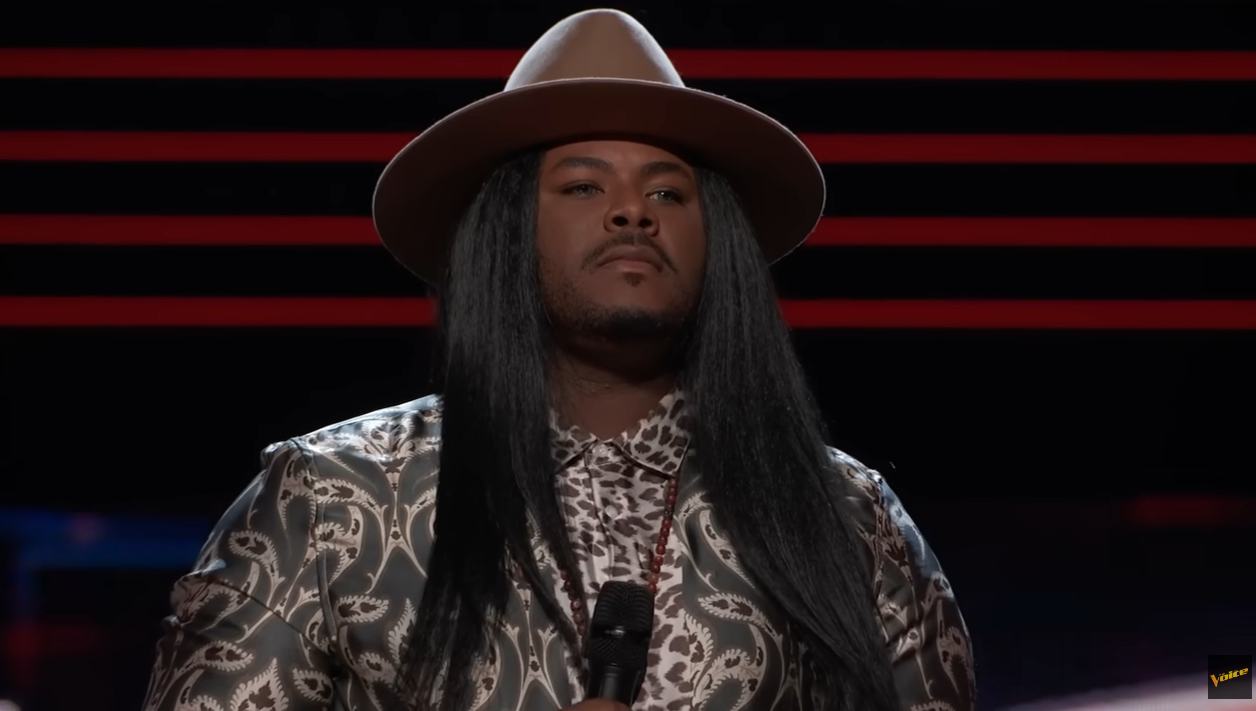
So, the LGBTQ pundits and culture watchers were … wrong. Or at the very least, anticipating “history” way before its time. After frustration over “American Idol”’s inability to crown an LGBTQ winner, they held high hopes for a new competing star-making vehicle, “The Voice.”
In 2011, the Advocate burst with excitement saying “There’s no need to wait on NBC’s new vocal competition, The Voice. The show boasts four gay contestants — two men and two women — heading into the battle round, where they will be coached by the likes of Blake Shelton, Cee Lo, Christina Aguilera, and Adam Levine. And while a couple of them might be eliminated in the next few weeks (in the battle round, teams of eight are whittled down to four when teammates face each other in a sing-off), chances that there will be a lesbian or gay singer competing to become the first ‘Voice’ are strong.”
Well. Not so strong. All of the LGBTQ contenders were eliminated. As were others over the years that even included a young trans man singing with his father as one of the show’s few duet contestants. “American Idol” did end up crowning an LGBTQ winner in its 18th season.
That was then … and this is now. After 25 seasons, “The Voice” has crowned Asher HaVon its winner. It is no wonder, as Asher’s vocal tone is hypnotic, rich, and blows through your auditory senses. Listening to him hit certain notes in his vocal runs can bring you to a flood of emotional tears. At least, it did for me.
It did for coach Reba McIntire as well.
The significance of Asher HaVon’s win goes beyond just a queer identity. It is adorned with a depth of representation and visibility. When Asher stepped on stage, he brought culture, diversity, history, and identity.
Like many incredible vocalists, he comes from a church foundation. Reba McEntire was a wise coach choice, relating to a broad reach of American sensibilities. She is one of the rare entertainers who is beloved by fans across the broad political spectrum. She is traditional, but an ally.
In a bit of irony, there is a segment of his hometown that still are keeping his LGBTQ status in the closet. The Selma Times-Journal brags about his “historic win,” but when they write about it, they are referring to the fact that he is the first winner from Alabama. They do not mention his LGBTQ identity at all.
Not sure how they could miss it. Asher presents in full-beat makeup with gorgeous nails to diva quality eye makeup and lashes. His costuming was never anything less than fabulous. His song choices placed him in a pantheon of LGBTQ-worshipped goddesses that included Adele, Beyonce, Whiney Houston, Patti LaBelle, Toni Braxton, Tina Turner, and Donna Summer. He was not only courageous to take on their groundbreaking hits, but did so with the talent to impress with his own versions of them.
As Asher stands on stage, he also represents a proud black man living in the spirit of America’s civil rights movement. He truly does represent Selma, Ala., and its fight for equality significance is part of his DNA and his history. In 2015, when President Barack Obama visited the city, Asher sang for him in front of a crowd of 200,000 at the famed Selma Bridge crossing.
While the significance of that event is not lost on him, Asher calls it one that he “will never forget”, he tells the Montgomery Advertiser that “The Voice” “is different because it is the Asher HaVon that most people never got a chance to see. I am free. I am walking in the authenticity of who I am, while sharing my gift. That means so much more to me than any other experience than I’ve ever had in life.”
While Asher carried his legacy, the history he represented, and his authenticity into every performance he gave over the show’s run, it was his pure talent that put him on top. It was so impressive that it even broke through the show’s premise of four celebrity coaches battling it out for a win. Under that guise, each of the coaches pleads with America to vote for their protégés.
Asher had most of them pleading for him instead. He initially received three “chair turns” at the outset where Chance the Rapper, Dan and Shay, and Reba were the celebrities campaigning for him to pick them. John Legend was the hold-out. Asher, ever the diva connoisseur, had already picked Reba in his mind and would have picked her no matter what anyone else had said.
Legend, later in the season, shared that he received a phone call from his dad who declared not only that he was rooting for Asher, but that Asher was “THE” voice of the season. Both Legend and Chance declared Asher to be “the best vocalist on the show” several times in their feedback statements.
While Asher’s win and authenticity should bring a source of joy to LGBTQ fans, it also is a big boost for his coach and main champion, Reba McEntire. While the show has put a full-throttle on Reba as the “queen of country” and showered her with adoration, she has had some difficulty in wowing many of the auditioning singers onto her team. Asher represents a significant win for her, as well as her being also the coach for first runner-up Josh Sanders, when she starts the next season against Gwen Stefani, Michael Bubble, and Snoop Dogg. The latter two are newcomers and Stefani boasts only one previous win years ago, but a loss in her one previous match-up against McEntire.
For the future Voice contestants, Reba has some serious creds to play.
For the rest of us, in the LGBTQ community, in the dance clubs, and in the hearts of ones needing a new diva to love, Asher has arrived.
Related:
Asher HaVon and Coach Reba perform Patti LaBelle and Michael McDonald’s ‘On My Own’ during ‘The Voice’ finale.
******************************************************************************************
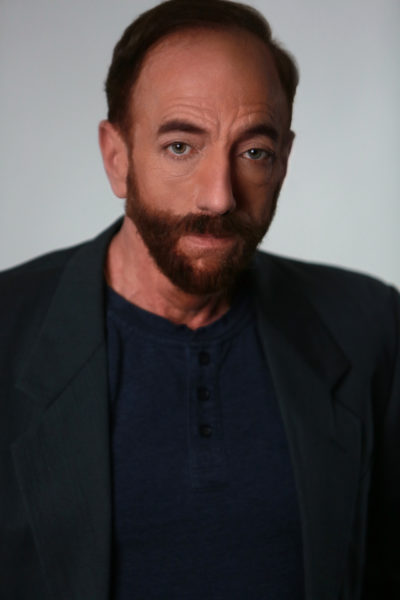
Rob Watson is the host of the popular Hollywood-based radio/podcast show RATED LGBT RADIO.
He is an established LGBTQ columnist and blogger having written for many top online publications including The Los Angeles Blade, The Washington Blade, Parents Magazine, the Huffington Post, LGBTQ Nation, Gay Star News, the New Civil Rights Movement, and more.
He served as Executive Editor for The Good Man Project, has appeared on MSNBC and been quoted in Business Week and Forbes Magazine.
He is CEO of Watson Writes, a marketing communications agency, and can be reached at [email protected]
Television
‘Interview with the Vampire’ returns in triumph
Long-awaited season 2 continues to get story exactly right

When AMC debuted its long-awaited series adaptation of “Interview With the Vampire” – Anne Rice’s seminal proto-postmodern horror novel that set the stage and paved the way for a decades-long literary franchise that has kept millions of readers, queer and straight alike, passionately engaged since first reading its thinly veiled allegorical document of life as a being with heightened awareness on the edge of human existence – in 2022, we were among the first to sing its praises as a triumph of narrative storytelling,
We were not the last. The series, created by Rolin Jones in collaboration with Christopher Rice – the original author’s son and a successful horror novelist in his own right – and the late Anne Rice herself, was one of its season’s best-reviewed shows, earning particular praise for its writing, in which the queer “subtext” of Rice’s original works was given the kind of unequivocal full weight denied to it in the Brad Pitt/Tom Cruise-starring Neil Jordan-helmed film adaptation from 1994.
Though purist fans of the original boom series took occasional umbrage to some of the show’s leaps – changing the historical period of the story to illuminate themes of racism and deepen its resonance for those living as “others” on the fringe of society, and making the book’s protagonist, Louis Pointe du Lac (Jacob Anderson), a closeted Black Creole man in early 20th-century New Orleans – the series won most of its naysayers over by its season finale. It delivered a deliciously subversive, unapologetically queer interpretation that remained true to Rice’s original gothic re-imaginings while expanding the scope to encompass social and cultural factors that have become central to the moral and ideological conflicts that plague us in the first quarter of the 21st century.
To put it bluntly, the show’s willingness to embrace the story’s countercultural queer eroticism and place its transgressively amoral “moral compass” front and center was more than enough to smooth over any nitpicking over faithfulness to narrative detail or tone that might otherwise have kept Rice’s legion of acolytes from signing on to the new-and-contemporized vision of the book that Rollins built as the foundation for his daunting project.
Now, after a buzz-tempering delay borne of last year’s actor’s strike, the series has returned for its second season. And we’re happy to assure you that its feet hit the ground running, keeping up both passion and narrative momentum to pick up the story with electrifying energy after leaving off (at the end of season one) with the shocking murder and seeming elimination of Lestat (Sam Reid), the exquisitely amoral “rock star” vampire who served as both protector and lover of Louis, and the departure of the latter and his perpetually juvenile “daughter,” Claudia (Bailey Bass) on s quest to find others like themselves.
Fans of the book might, in fact, find new reasons to take exception to the show’s adaptation, which, as in season one, makes significant departures from the original narrative. After moving the story’s setting forward by roughly half a century, Louis and Claudia’s secretive sojourn now takes place in the traumatized landscape of post-WWII Europe, and spins a scenario in which the two ex-pat vampires, navigating their way through the perils of Soviet-occupied Central Europe after the fall of the Nazi regime, spend time in a refugee shelter while investigating rumors of old-world vampires who might provide a link to their “family history.”
When we rejoin this pair of relative fledgling vampires, their undead existence is a far cry from the decadent elegance they enjoyed in the New Orleans setting of season one. Enduring a near-feral existence as they make their way through a war-ravaged landscape, they find no shortage of prey in the aftermath of the Third Reich, but the “creature comforts” of their former “afterlives” are now only a memory. Louis is devoted, as always, to Claudia (now portrayed by Delainey Hayles, presumably due to scheduling conflicts for original actor Bass, who is set to reprise her role from “Avatar: The Way of Water” in the next installment of filmmaker James Cameron’s high-dollar sci-fi franchise), but remains haunted by his vampire maker and former lover Lestat, whose undead corpse remains buried on another continent but whose charismatic presence manifests itself in his private moments, nonetheless. In the first episode, the pair have used their supernatural wiles to journey into the “old country” long associated with their kind, tracking human tales of monstrous terrors in the night in hope of connecting with more of their kind. Louis, as always, struggles with his compassion for the mortal beings around him, while the more savage Claudia simply sees them as prey, and holds little hope of finding other vampires, if they even exist. For her part, Claudia has forgiven – but not forgotten – his refusal to ensure Lestat’s demise by burning his body, and is now solely focused on finding others like her.
Of course, the adventures of these two undead companions are only half the equation in “Interview With the Vampire.” The past is, as always, merely a flashback, as Louis relates the story of his afterlife experiences to mortal journalist Daniel Molloy (Eric Bogosian). In the present, the skeptical Molloy casts doubt on the truth of his memories, forcing the vampire to re-examine them as he goes. Perhaps more interestingly, in the long game of a series which, if it comes to full fruition, will eventually encompass the entire Rice vampire saga, these contemporary scenes give us a look at the relationship between Louis and Armand (Assad Zaman), revealed in the season one finale to be not a mere servant in Louis’ household but a centuries-old fellow vampire who is now Louis’ lover and companion.
Fans of the books, of course, know that Armand plays a significant role in the story of the past, too, and while we won’t spoil anything, we can say that history begins to unspool as season two progresses – but that’s getting ahead of ourselves. For now, what we can say is that season two’s first episode, while it may veer away from the familiarity of Rice’s original tale in service of reimagining it for 21st-century audiences, continues the first season’s dedication to breathing thrilling new life into this now-iconic, deeply queer saga; superb performances all around, an elegantly cinematic presentation and literate writing, and a lush musical score by Daniel Hart all combine to sweep us quickly and irresistibly into the story, making us not just fall in love with these vampires, but want to be one of them.
That, of course, is the gloriously sexy and subversive point of Rice’s “Vampire Chronicles,” and this long-awaited series continues to get it exactly right.
-

 U.S. Supreme Court2 days ago
U.S. Supreme Court2 days agoSupreme Court to consider bans on trans athletes in school sports
-

 Out & About2 days ago
Out & About2 days agoCelebrate the Fourth of July the gay way!
-

 Virginia2 days ago
Virginia2 days agoVa. court allows conversion therapy despite law banning it
-

 Maryland4 days ago
Maryland4 days agoLGBTQ suicide prevention hotline option is going away. Here’s where else to go in Md.

